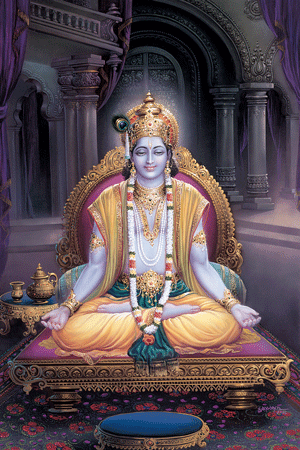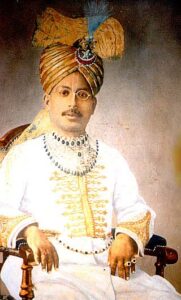Once upon a time there was a war between the demigods and the demons.
The demigods came to earth, to India, where there was a powerful king named Khatvanga Maharaja. They requested him to help them- to become their general, their commander.
He told them, “Yes I am coming.”
And he went to the battlefield. It was a very big war, and at last the king defeated the demons. Some of them were killed, and the rest fled away.
All the demigods then requested the king, “Whatever boon you want, we will give you. We will give you anything you want.”
The King said, “Actually, I want salvation from this world, and I want to serve the Supreme Personality of Godhead.”
The demigods said, “We are not able to give you that. You can ask for another boon.”
The King then said, “Then you should tell me when my death will come.”
They replied, “Very soon; in 24 minutes!!!”
He therefore requested that, “At once you should take me to India, to earth.” And they did so
.
When the king arrived, half of the time was gone and only 12 minutes remained.
He sat in a lotus position like a muni, and concentrated on the lotus-feet of Krishna. Thus, in a moment, he was liberated; and he had a chance to serve the lotus-feet of Krishna.
He went to spiritual world.
( This story is from Šrimad Bhagavatam 2 canto )
Moral of the story:
We are not so fortunete as Maharaja Khatvanga to know when we well die. So better every moment surender to Krishna. Even a moment can give us all perfection; but what are we doing?
We are not engaged in pure bhakti. We have so many requirements-worldly requirements. In order to maintain our life we are busy in so much not essensial things. We are very busy to solve our material problems.
As much as we try to solve these problems, however, the more problems are coming like waves of the ocean-one by one. We consider, “Oh, if I cross this one, everything will be alright.” But instead we see that, “Oh, now there are more problems!”
So don’t try to do all this. What should we do? We should chant and remember Krishna. Thus, automatically all the waves of problems will be solved, and life-maintaining will also be accomplished. Everything will be done.
We should only try to solve the problem of how to attain the service of Krishna, and especially how to attain Vraja-bhakti.
If you want a little money, you can attain it by very little effort. However, if you want the highest thing, you’ll have to do so much effort. It will not be quickly achieved.
And what is that highest thing?
Prema-bhakti. You will have to give your precious time-everything-for this. You will have to be a street beggar, and there is no harm in that.
Even krishna show how to meditate. Every morning when he wake up he mediatate on himself! But we must meditate on him! He is Supeme and he show we need to meditate on Supreme.
This story of Maharaja Khatvanga from the Śrimad Bhāgavatam offers profound spiritual insights and practical advice for those pursuing a path of devotion and surrender. Here are the key lessons and reflections derived from the tale:
Lessons from Maharaja Khatvanga’s Life
- Impermanence and Urgency: Maharaja Khatvanga was given a unique opportunity to know exactly when he would die, which brought a sense of urgency to his spiritual practices. This underscores the unpredictable nature of life and the importance of living each moment with spiritual awareness, as we do not have the fortune to know our time of departure from this world.
- The Value of a Moment: The story dramatically illustrates that even a brief moment, if perfectly utilized, can lead to ultimate liberation. Khatvanga Maharaja achieved perfection in just twelve minutes by focusing intensely on the lotus feet of Krishna. This teaches that quality of devotion can sometimes outweigh years of practice—if the heart is truly focused.
- Prioritization of Spiritual Goals: Faced with the choice of any boon, Khatvanga Maharaja chose liberation and the opportunity to serve the Supreme Personality of Godhead over any worldly rewards. This exemplifies the prioritization of spiritual aspirations over temporary material gains.
- The Limitations of Material Achievement: Even as a victorious king and commander, Khatvanga Maharaja recognized the limitations of material achievements and pleasures. His request for spiritual emancipation highlights the understanding that true fulfillment comes not from material success but from spiritual progress and connection.
- Simplicity in Spiritual Practice: The story advocates for a simple yet profound spiritual practice—chanting and remembering the name of Krishna. It suggests that amidst life’s complexities and challenges, the simple act of remembering the divine can be a source of profound peace and ultimate solution to life’s problems.
- Surrender and Dependence on Divine Grace: Maharaja Khatvanga’s surrender to Krishna in his final moments teaches the power of complete dependence on divine grace. His example encourages devotees to surrender fully to God’s will, trusting that such surrender can lead to the highest spiritual achievement.
- The Continual Struggle with Material Desires: The narrative also reflects on the human condition of being entangled in material desires and problems. It teaches that spiritual focus can help navigate and eventually transcend these material complexities.
Conclusion: Living a Life of Devotion
Maharaja Khatvanga’s story is a vivid reminder of the impermanence of life and the supreme importance of devotion. It calls on individuals to live a life centered around spiritual goals, utilizing every moment to deepen one’s relationship with the divine. By prioritizing spiritual growth over material pursuits and practicing constant remembrance of Krishna, one can achieve the highest state of peace and fulfillment.
In the journey of life, let us remember the lessons of Maharaja Khatvanga and strive to attain pure devotion, dedicating our efforts to the service of Krishna and embracing the simplicity and power of chanting His holy names.
Hare Krishna, Hare Krishna, Krishna Krishna, Hare Hare, Hare Rama, Hare Rama, Rama Rama, Hare Hare.
May these stories inspire and guide all on the path of righteousness and divine love.



